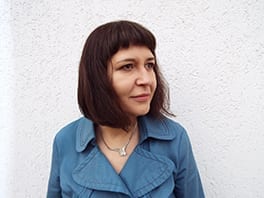Anna Auziņa, University of Latvia, was awarded the 2017 Birnitis fellowship for “Woman’s Experience and Language in Vizma Belševica’s, Ārija Elksne’s and Monta Kroma’s Poetry”
 As a poet, I was interested for a long time in why sometimes I am given an award for showing a “woman’s world” in my poetry, while no male poet is praised for showing a specifically “man’s world”. When I turned to academic life, my main interests were gender and poetry. I saw that several important Latvian women poets are not yet enough studied. Since I was interested if woman poets use language in a specific way, I decided to write a dissertation about the key women representatives of 20th century Latvian poetry: Vizma Belševica, Ārija Elksne and Monta Kroma.
As a poet, I was interested for a long time in why sometimes I am given an award for showing a “woman’s world” in my poetry, while no male poet is praised for showing a specifically “man’s world”. When I turned to academic life, my main interests were gender and poetry. I saw that several important Latvian women poets are not yet enough studied. Since I was interested if woman poets use language in a specific way, I decided to write a dissertation about the key women representatives of 20th century Latvian poetry: Vizma Belševica, Ārija Elksne and Monta Kroma.
Vizma Belševica is probably the most famous of them, nominated for a Nobel Prize and translated into English, Swedish and many other languages. Belševica’s poetry is both modern and connected with folklore and history. Belševica was most severely persecuted by the Soviet regime for formalism as well as for the political and historical transgressions in her poetry. Because she criticized the situation of oppressed nations in Soviet Union during the 1960s, her works were banned from publication for several years.
Monta Kroma is one of the most uncommon Latvian poets – a brilliant modernist, whose poetics is different from the mainstream both in terms of the subject and form. Kroma started writing in the 1940s with stanzas of socialist realism; however, since completing studies in Moscow in the 1960s, she mostly writes in vers libre, revealing a woman’s inner world in the city, which in the context of the Soviet ideology made her poetry rather individualistic and not always officially accepted. Although, being communist since beginning of 1940s as well as a veteran of the Second World War, she did not suffer from the Soviet regime as much as Belševica. Still her colleagues were mostly not ready for her innovation and she was often criticized.
Ārija Elksne was most popular among readers during the 1960s, ‘70s and ‘80s. Her poetry is usually considered as very feminine, expressing specifically women’s experience. Ārija Elksne is also among the poets who accented history and Latvian national culture, which was unacceptable in Soviet Latvia. In the 1960s she was criticized for her interpretation of history and insufficient public activity in poetry, although not more than many of the other brightest poets of her generation. The criticism she received in the 1970s was not directly related to the attitudes of the regime.
The main research question of the dissertation was: how does Latvian poetry of 1960-70s, written by women authors, express women’s experience in specific feminine language?
I have come to conclusion that, in the poetry of all three poets, the stereotypes of feminine and masculine are varied or broken, attributing positive qualities, which are often related to the masculine, to images that are commonly seen as feminine. In Belševica’s and Kroma’s poetry, the binary oppositions themselves are questioned. The feminine in the language of Belševica’s and Kroma’s poetry manifests in different modifications of form – the change of syntax, punctuation marks, omissions, graphical outline, thus transforming the semantic level as well. Meanwhile in Elksne’s poetry, there is mostly a correct expression where the content is self-evident. The intonations of Belševica and Kroma are mostly open, fluctuating. Meanwhile, in Elksne’s poetry often exactly the feminist ideas are expressed in masculine intonations (with the aim of strengthening power) – didactic, sarcastic, rhetorical.
However, the question “how” includes much more. Last year I was able to consider poetry of these three woman poets as well as a string of other authors to analyze their work according to feminist literary theories. I was able to concentrate on this study, which would not have been possible without Aina Birnitis Grant, so I very much appreciate that opportunity. After the dissertation defense, I plan to continue this study to publish a book about three women poets.
